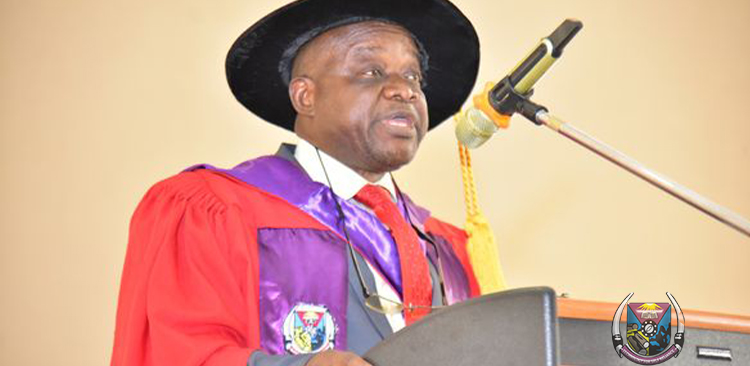

A Professor of Architecture (Urban Housing) at the Federal University of Technology, Akure, FUTA Adeniyi Taiwo has called on the Federal government and governments at other levels to reappraise collaboration with the private sector to reposition the housing sector for improved and efficient housing delivery to Nigerians, especially the low income earner. He made the call while delivering the 163rd inaugural lecture of the university on Tuesday, 9th January, 2024 at the Obafemi Awolowo auditorium of the institution.
Taiwo, who spoke on the topic, “Sustainable Housing for All Through Public-Private Partnerships: Myth or Reality?” said due to the rapidly growing population of the country, the demand for adequate decent and affordable housing units outstrips the supply. He said in urban centres, poor housing conditions often manifest in the high numbers of people living in one room, leading to physical overcrowding culminating in health hazard and harmful social behavior. He described overcrowding as a health hazard where ventilation is poor causing infections (air and water-borne). Dwelling on how to leverage on the Public-Private Partnerships, he said “it has become clear that there is a need to restructure existing partnership arrangements to incorporate beneficiaries’ input, as exemplified by community participation, adding that the participation for low-income housing delivery would not be an end, but a means to an end. He described the end to mean the provision of mass, decent and affordable houses in the cities.”
The don said there is no single model for participation that would fit into the different kinds of scheme taking place in the country, since there are varying participants and contexts, thus government must continue to resist the urge to involve itself in direct housing construction, but rather encourage the private sector by providing the necessary enabling environment. In order to achieve effective housing for all and give conducive conditions to the private developers, the lecturer recommended that under the public-private partnership initiative, the private sector should be given conducive conditions in terms of obtaining loans, particularly for housing development and delivery to low-income earners. He added that all Memoranda of Understanding (MoU) between public and private entities should contain a meaningful place for representation of beneficiaries and such should be implemented to the letter. To lay credence to this Professor Taiwo said “for any project that would involve public servants, the Nigerian Labour Congress or Trade Union/Associations must be consulted at every phase.” Professor Taiwo, a member of several professional bodies in his field of study, frowned at unnecessary bureaucracies in operating PPP. He said “to further strengthen housing delivery through the public-private partnership, administrative bottlenecks must be removed from authorities and agencies who are responsible for regulations, approvals and checking statutory requirements regarding construction standards and safety. This is not to say that standards in design, detailing, quality of construction and quality of building materials should be compromised.” He thus called on the Federal Mortgage Bank of Nigeria to collaborate with the Nigerian Building and Roads Research Institute (NBRRI) to research and exploit cheaper and sustainable building materials to achieve housing for all such that low-income earners can be guaranteed better access and affordability to sustainable housing.
Reviewing government’s effort in housing delivery in Nigeria, the don said “Owing to the failure of the housing scheme planned during the earlier national development plans, an elaborate national housing scheme based on the concepts of affordability and citizen participation was embarked upon in 1980. The target group was the low-income earners whose annual income did not exceed equivalent of $31.25 who were to be provided with one-bedroom core houses. Between 1983 and 1988, it was obvious that government’s performance at increasing housing stock was generally low when compared with previous housing programmes and efforts. A new housing policy evolved in 2002 which influenced the establishment of an institutional apparatus such as the Federal Ministry of Housing and Urban Development (FMHUD), the restructuring of the Federal Mortgage Bank of Nigeria (FMBN), and other relevant associations like the Real Estate Development Association of Nigeria (REDAN) and the formation of the Building Materials and Pricing Association of Nigeria (BUMPAN). A public-private partnership was therefore set up to engage in projects and the public sector was meant to merely play the role of a collaborator, facilitator, supervisor, etc.”
On the role of architectural education in the development of sustainable housing in the country, the don recommended an improvement in the existing role. He said “it is necessary to increase the housing research contents of the architecture curriculum in the ongoing discussions on Core Curriculum and Minimum Academic Standards (CCMAS) of the National Universities Commission (NUC) by placing greater emphasis on aspects of the social sciences and humanities dealing with human settlements.”
In her remarks, Chairman at the lecture and Vice Chancellor, Professor Adenike Oladiji described Professor Taiwo as a great academic who has contributed immensely to his field of study in churning out numerous scholars who have become trail blazers in the country and beyond. She said the title of the lecture was apt and will further help government and all stakeholders in repositioning housing related matter in the society.